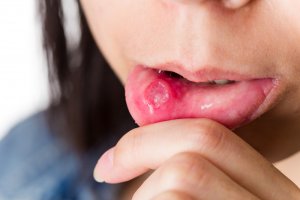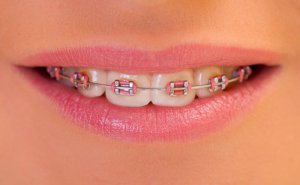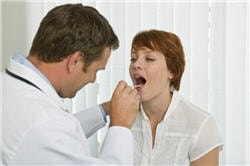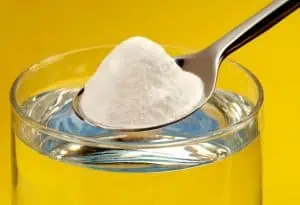A mouth ulcer, or canker sore, is usually nothing to worry about. They are often benign and disappear as easily as they appear but they can be very painful. They commonly develop inside the cheeks or lips, but you can also get a gum or tongue ulcer.
Few people have never had one. But when they do appear, we often don’t know what to do. Although they usually go away by themselves, there are various treatments and home remedies for mouth ulcers which help them clear up faster.
On rare occasions, a canker sore can signal a more serious health problem, so it’s important to know the warning signs.
In this article we explain:
- The different kinds of mouth sores
- What causes them
- What you can do to treat them
- When you might need to see a doctor
What is a canker sore?


A canker sore is a sore that appears on the inside of the mouth, including on the tongue, cheeks, gums, and roof of the mouth. These painful wounds are also known as ‘mouth ulcers’. These ulcerations are typically around 4 mm in diameter with reddish edges and a yellow or light center. One or more sores can develop at once.
Despite being so small, ulcers in the mouth – and particularly on the tongue – can be incredibly painful. Anyone can get them, although young adults and females are most prone to developing canker sores. The good news is that they are usually nothing to worry about and they should clear up in a week or two without any medical intervention. The pain they cause normally lasts for just a couple of days.
Although it isn’t necessary to treat a mouth or tongue ulcer, there are things you can do to aid healing. We offer some treatment and prevention advice later on.
Generally, mouth ulcers are harmless – and they go away uneventfully in a few days. However, if you feel that you have an ulcer that has not healed for more than 2 weeks, it is a cause for concern. You must visit your dentist immediately.
–Dr. Fanar Swaida
Canker sores are not contagious, and shouldn’t be confused with cold sores. Cold sores occur around the mouth or on the lips, and these can be passed from one person to another through contact.
Different types of mouth ulcers
Aside from occasional occurrences, there are three main categories of mouth sore:
- Recurrent aphthous stomatitis
People with this condition get ulcers frequently; perhaps three or six times a year. This may continue for several years before gradually disappearing. Sores are usually most painful in the days after they first develop.
There is nothing that can be done to cure this condition, but there are ways to manage discomfort during outbreaks, mostly involving symptomatic treatment and preventive care. These ulcers are thought to be somehow linked to the immune system.
- Giant ulcer
This kind of ulcer is quite rare but extremely painful. It presents as one or more lesions that can be anywhere from 1cm to 5cm in size. Healing can take a month or more, and the ulcer often leaves scarring.
- Miliary ulcer
Also relatively rare, this kind of ulcer appears as clusters of lesions. Several dozens may appear at once. They are very painful but benign and heal in one or two weeks.
What causes mouth ulcers?


The exact causes of ulcers are unknown, but when you have one, it’s often quite easy to find a potential reason why. Simple ulcers are usually blamed on fatigue and stress. Others on physical damage to the mouth tissue. Wearing metal braces or dentures, for example, can irritate the tissue in the mouth and lead to sores. Sharp edges on damaged teeth can have the same effect. Hormonal imbalance in women during menstruation or pregnancy can also cause mouth ulcers.
If you accidentally bite your tongue or slip while brushing your teeth, the resulting damage to your mouth tissue could lead to an ulceration.
When it comes to more complex cases, the cause of the ulcers is often an underlying health condition. Examples include:
- A deficiency in folic acid, iron, zinc or vitamin B12
- COVID-19
- Immune system impairment
- Food allergies
- Gastrointestinal tract diseases, such as celiac disease and Crohn’s disease
- A reaction to common medicines
- Hand, foot and mouth disease
- Mouth cancer
- Herpes virus
Also note that people who have just stopped smoking may start getting more canker sores than normal, but this is just temporary.
Mouth ulcer treatment


Treatment for aphthous ulcers on the tongue, gums or cheek most often simply involves applying pain relief and antiseptic treatment. This can be in the form of topical rubbing gel, ointment, spray or cream. All you can really do is reduce your discomfort and minimize the chances of over-infection while your body heals the area.
There are some simple steps you can take to help with the healing process:
- Use a soft toothbrush and brush gently
- Avoid foods that are very spicy, sour or sweet
- Stick to soft foods until the ulcers heal
- Drink through a straw (especially acidic drinks like coffee, soda, and fruit juice) to prevent direct contact with the ulcer
- Avoid fizzy drinks
- Avoid chewing gum
- Stop using activated charcoal powder or toothpaste until the sore is healed
Once the ulcer has healed you can return to your normal eating and drinking habits, but be sure to get regular dental checkups.
Other types of mouth ulcer may require treatment with medicines prescribed by your doctor, including antibiotics. Occasionally a regular ulcer can become infected and develop into an oral abscess.
You should see a doctor if:
- You are in severe pain
- Any pain from the sores persists for more than a few days or gets worse
- The ulcers don’t clear up after two weeks
- You have lesions larger than 1/2 an inch in diameter
- You get more than four lesions at a time
- They are stopping you from eating
- You keep getting mouth ulcers (more than four times a year)
- The ulcers bleed
- You have a high temperature or you feel tired
- You have other bodily lesions
Finally, a lesion that looks like a mouth ulcer but causes no pain is quite often not one. You should consult a doctor to check for other oral health problems.
Home remedies for mouth sores
Assuming you have none of the above issues, you may choose to treat your canker sores at home with natural products. Here are a variety of ideas to try if you want to reduce pain, soothe inflammation and keep the area clean:


- Warm salty water: gargle several times a day for pain relief.
- Lemon juice: this will sting at first but can offer relief as lemons have anti-inflammatory properties. Apply it with a Q-tip/cotton swab 4 times a day.
- Ice cubes: the cold will reduce the inflammation and the pain.
- Licorice: it can relieve burns and is an excellent healing and anti-inflammatory agent. It can be bought in the form of a patch you can stick directly over the ulcer in your mouth. Don’t worry – the patch does not prevent you from speaking or eating.
- Black tea: rich in tannins, black tea has analgesic properties. Apply a damp teabag that has been soaked in boiled water and then cooled, and leave it for a few minutes.
- Cider vinegar: using a Q-tip, apply a little cider vinegar directly onto the canker sore.
- Sweet bay essential oil: take a Q-tip dipped in a drop of sweet bay essential oil diluted with a little olive oil and rub it directly onto the mouth ulcer.
- Tea Tree essential oil: apply using a Q-tip 3 times a day, but for no more than 3 days.
- Clay: with the help of a Q-tip, spread some green clay over the area and leave it for as long as possible.
- Propolis: this substance that is gathered by bees contains components that are anti-inflammatory, healing, antiseptic, anesthetic and purifying. You can chew on a bar of propolis and keep it in your mouth for as long as possible. You can also apply a propolis oil solution to the area and massage it or use it as a mouthwash.
The best treatment for mouth ulcers will vary from one person to another, so try a few and see which ones help you.
Mouthwash for mouth and tongue ulcers


Ulcers on the tongue may be particularly painful as they rub against your teeth when you talk. These mouthwashes are easy to make at home and help reduce pain and risk of infection:
- A baking soda mouthwash: to relieve your pain and reduce the risk of infection, mix one teaspoon of salt with one teaspoon of baking soda in 120 ml of water. Gargle with this solution 3 or 4 times a day.
- A green clay mouthwash: dilute one teaspoon of green clay in a glass of warm water, mix and use as a mouthwash at least once a day.
- A great mullein mouthwash: this medicinal plant will soothe irritations and pain. Pour a cup of boiling water over a tablespoon of great mullein dried flowers and leave to steep for 10 minutes. Filter and use as a mouthwash.
How to treat a baby or child with mouth sores
Ulcers can appear in the mouth at any age, so children and babies are not exempt. In fact, mouth sores are fairly common between the ages of one and three. If you notice your child frowning in pain or crying while trying to eat, check their mouth for ulcers. The pain might make it uncomfortable for them to chew, swallow, or brush their teeth properly.


As with ulcers in adults, they are often benign and disappear by themselves. However, they might also be caused by certain foods or medicines or an immune system weakened by childhood illness. Follow the same precautions as above, and take your child to the doctor if the ulcers persist or you can see several at once.
Do what you can to prevent damage to the tissue inside your child’s mouth. We know it can be hard to keep an eye on everything they chew on, but anything rough or sharp is more likely to cause damage and open the way for ulcers. If your child sucks his or her thumb, remember to cut their nails regularly.
While an ulcer is healing, you may administer pain relief as advised by your pediatrician. Also avoid feeding your child very hot, very sweet or very salty food as this can intensify the pain.
Some home remedies are suitable for children but others are not. For example, tea tree oil should not be used before the age of 3. Ask your chemist or doctor for advice, even when it comes to natural treatments.
How can I prevent mouth and tongue ulcers?
There is no guaranteed way to prevent ulcers in the mouth, but there are some things you can do to reduce the chances of them developing.
Good oral hygiene is, of course, essential. Use a soft toothbrush and take care when you brush to avoid damaging your gums. Floss daily and visit your dentist regularly. Using mouthwash following the recommendations of your dentist can also help.
You may also find that certain foods and drinks irritate your mouth and cause sores to develop. These are different for each person but commonly include salty foods, spicy foods, hot drinks, and acidic foods and drinks. It can be hard to identify a single culprit but if you do, you should limit your consumption of that item.
If you’re concerned about developing sores because of braces, consider the different options available. There are many different types of orthodontic appliances now on the market, and not all have protruding metal brackets.
The following short video offers helpful advice about mouth sore prevention:
Conclusion
Mouth ulcers are very often benign but can be quite painful. Although they should disappear by themselves, you may want to treat them to speed up the healing process and reduce any discomfort.
The causes are difficult to identify, so it’s better to focus on treating the current problem. You can then take steps to minimize the chances of them redeveloping. There are lots of home remedies that will help relieve pain and fight infection.
If a canker sore is very painful or completely painless, you should seek medical attention. Also, consult a doctor if you keep getting ulcers, or they take more than two weeks to heal. They can be a sign of more concerning health issues, so it’s best to get checked out if in doubt.
FAQs
Why are canker sores more common in women?
Canker sores are more common in women because of hormonal imbalances during menstruation and pregnancy. These changes especially the increase in progesterone can also cause swollen and bleeding gums.
Why do I get canker sores when I am studying for exams?
Stress and anxiety seem to be some of the most common causes of canker sores. That’s why many people experience canker sores when studying for finals, or during stressful periods in their lives.




